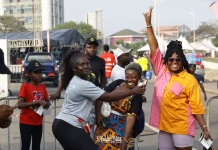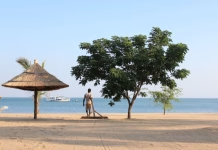
In Caroline Boateng’s metaphorical exploration of the number eight, she presents the shape as more than just a figure. The number eight, with its well-rounded loops at both ends and on both sides, symbolizes continuity and interconnectedness. As Boateng observes, breaking this figure is no simple task. The loops seem to reinforce each other, creating an unbroken whole—suggesting that to sever its shape would require not just a simple act of division but destruction. When the figure eight is broken, it no longer maintains its original form, becoming two separate circles, or as Boateng provocatively puts it, two zeros. This imagery brings to life the depth of the challenge encapsulated in the political mantra “Breaking the 8.”
In the context of Ghana’s political landscape, “Breaking the 8” is the rallying cry of the New Patriotic Party (NPP) as they prepare for the 2024 elections. This phrase has become a powerful symbol of their campaign, aiming to break the traditional cycle of power alternating between the two dominant parties— the NPP and the National Democratic Congress (NDC)—which typically lasts for two consecutive terms, or eight years. No political party has successfully held onto power for more than eight years since the Fourth Republic’s inception in 1992. Hence, the goal of “breaking the 8” represents a desire to defy historical precedent and remain in power beyond two terms.
However, as Boateng’s metaphor of the number eight suggests, achieving this feat is not merely a matter of rhetoric or strategy; it demands something far more transformative. The figure eight, with its inherent complexity, suggests that breaking this cycle is akin to attempting to divide an inseparable whole. It reflects the deep-seated political culture in Ghana, where power swings like a pendulum between two established forces, and disrupting this pattern will require more than just a slogan.
For the NPP, breaking the eight means not only winning another term but reshaping the political narrative in Ghana. It would require demonstrating to Ghanaians that the party has achieved significant progress, addressed key socio-economic challenges, and delivered governance that resonates with the aspirations of the people. Yet, as Boateng’s analogy implies, there is a fine line between breaking the figure eight and destroying it. If the NPP fails to preserve the trust and goodwill of the electorate, they risk turning the symbolic eight into two zeros—meaning they could lose everything.
The choice of the figure eight is especially profound because, in mathematics, eight is a number of balance and renewal. It is an even number, divisible by multiple factors, but in its geometric form, it is unbroken and continuous. Politically, the NPP must therefore prove that they are capable of maintaining balance—delivering development and preserving stability—while also pushing for renewal by addressing the concerns that have surfaced over their eight-year rule.

For their political opponents, the NDC, the challenge is clear: they must prevent the NPP from breaking the eight, using the cycle of alternating governance to their advantage. For them, the number eight represents a natural endpoint—a moment when the pendulum of power is meant to swing back in their direction. Their task is to argue that after two terms of the NPP, it is time for change, a message they will rally around in their own bid for electoral victory in 2024.
Ultimately, Boateng’s reflection on the number eight transcends the numerical. It speaks to the deep complexity of power dynamics, the endurance of political cycles, and the difficulty of achieving lasting change in a system that seems designed to revert to its previous state. “Breaking the 8” may be the NPP’s rallying cry, but it also carries within it the acknowledgment that this is no easy feat. The metaphor of the figure eight, with its unbroken loops, challenges both the NPP and Ghanaian voters to consider the profound nature of their political decisions.
As Election 2024 approaches, the true test will not simply be whether the NPP can break the eight but whether they can do so without breaking the trust of the people. And should they succeed, they will have altered the very fabric of Ghana’s democratic tradition, forging a new political path that defies the cycles of the past. Whether the eight remains unbroken or splits into two circles—zeros representing lost opportunities—will be determined by the collective will of the Ghanaian electorate. As Boateng implies, breaking the eight may well be possible, but it is a difficult and risky endeavour.
Written by Michael Kwasi Ackumey
Phone no.0246416609
Email: ackumey45@gmail.com
Consultant, Africa Development Council


















